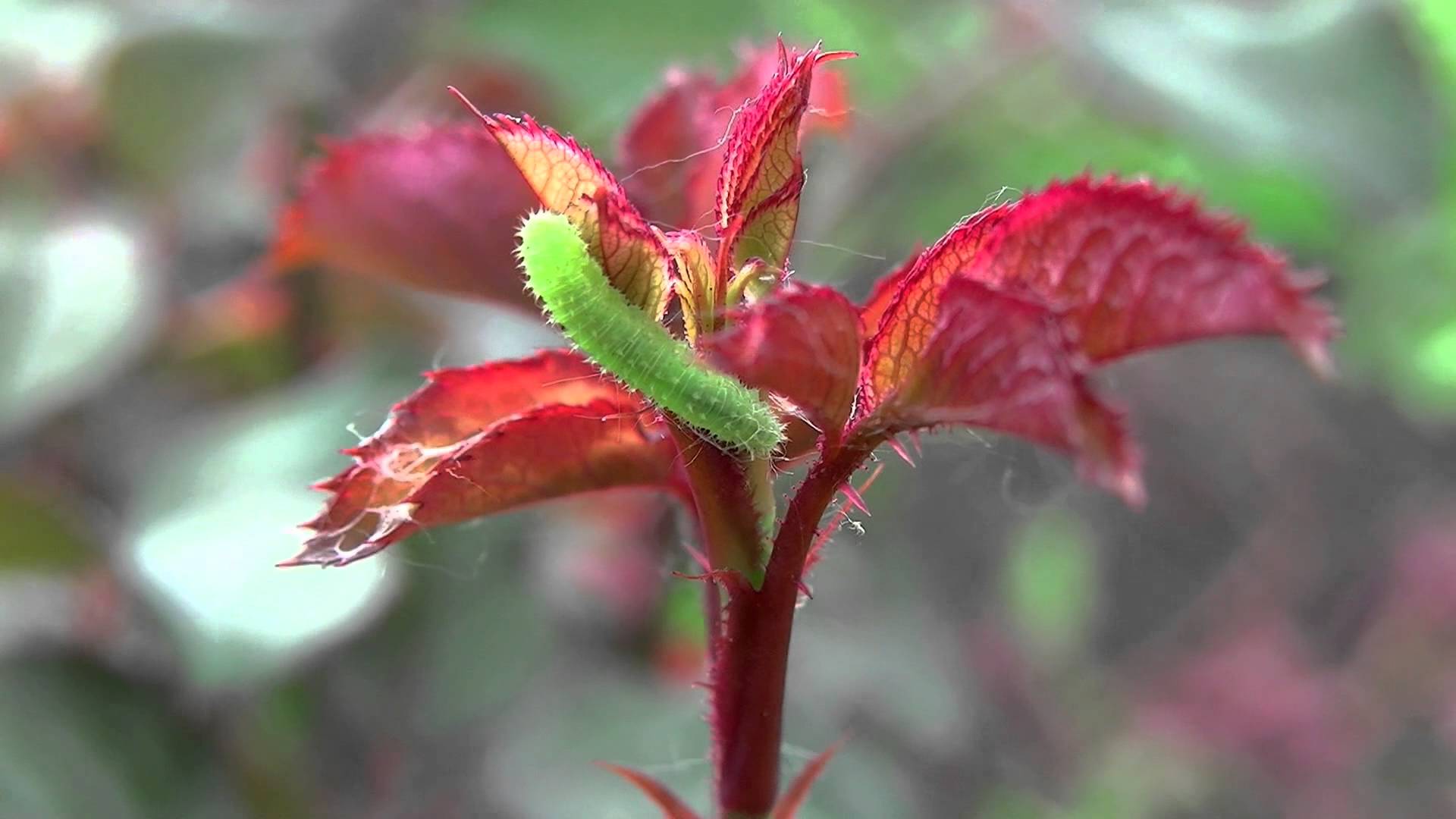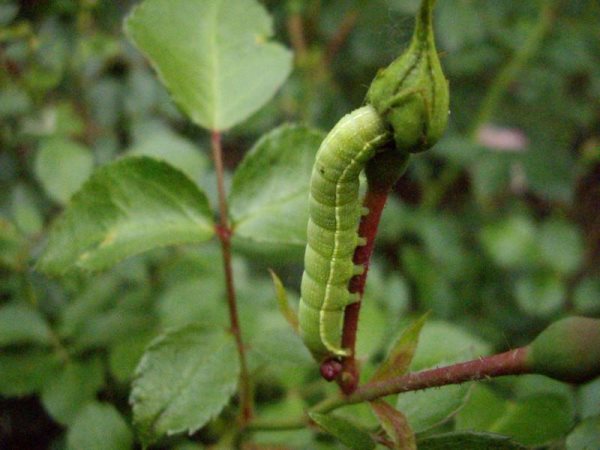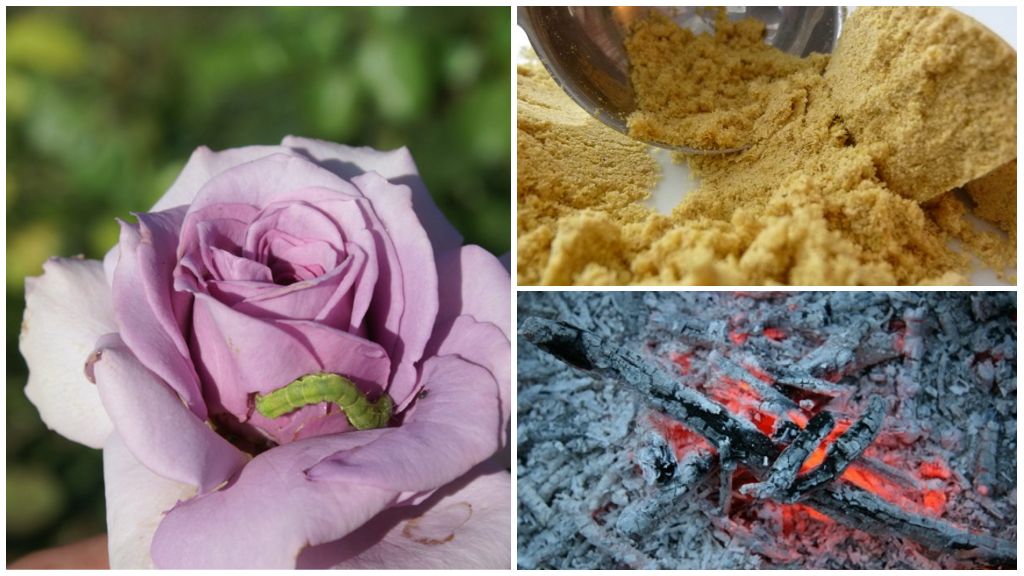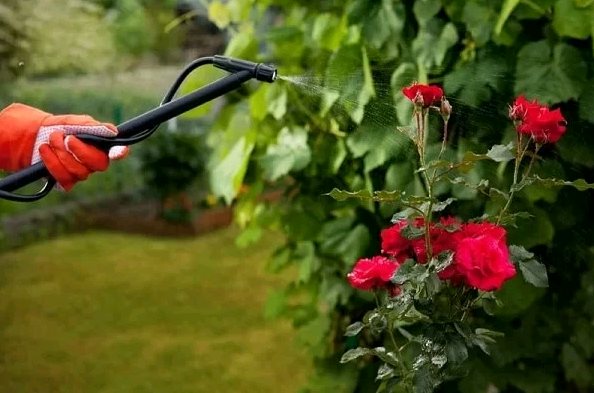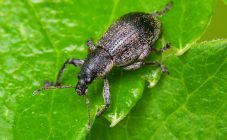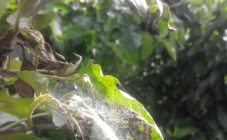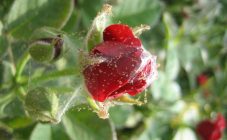Content:
The warm season attracts various pests to the garden. They can ruin the exterior of the roses or even destroy the plants. From the article, the reader will learn why caterpillars on roses are dangerous, as well as how to treat the bushes for treatment and prevention.
What is the danger of these pests
Green caterpillars are the main pests of roses. They attack rose bushes by eating the buds and pulp of the plant. After their invasion, holes remain in the leaves. As a result, nutrients are delivered to the roots and shoots more slowly. Plants lose their shape or die.
Caterpillars attack roses, which are most often in the shade. They fall on the bushes, moving from a deciduous tree. The most active time for them is early spring. Caterpillars penetrate the inner part of flowers, spoiling all the buds. It is most convenient for these pests to devour the petals, which causes the appearance of the flower to suffer.
The fight against the tracks is carried out by collecting them manually. This method of removing parasites from flowers is difficult and does not give the desired result. Collected some caterpillars, others will appear. How, then, is it effective to deal with pests?
Modern suburban stores offer a variety of chemicals. But, if you do not take them into account, then ordinary mustard will do. But this method will not only stop the caterpillars, but also damage the bushes themselves if you use the wrong dosage.
Caterpillars on roses: how to process
Leafworm caterpillars lay eggs in autumn. To do this, they choose places under the bark of a tree, in an old stump or in layers of leaves. Small caterpillar larvae of green-brown color emerge from the eggs. This happens in early spring. One clutch of such caterpillars will yield a couple of hundred eggs, which poses a serious threat to roses.
What chemicals help fight caterpillars
Gardeners carry out the fight against caterpillars in different ways. Dacha goods stores offer chemicals of various actions. They can easily cope with the larvae and help to avoid repeated attacks of parasites. It is best to treat roses from pests in the morning or evening when the weather is dry.
If there are green caterpillars on the roses, what is better to process:
- The drug is nitrofen. To get rid of plants from parasites at the beginning of their appearance, in order to reduce the degree of damage to roses, they are sprayed. For this, a nitrofen solution is used. This procedure is done with the onset of early spring. This remedy will be effective when the larvae are just beginning to appear. It will neutralize a repeated attack for about 2 months. For processing, dilute 300 ml of the substance in 10 liters of cold water. The resulting solution must be sprayed with all the roses and growing crops nearby. To do this, take a watering can, spray bottle or spray bottle.The main thing is to carefully read the description of the drug so as not to harm the flowers.
- Aktara is an insecticide and has a wide range of effects. To get rid of rose bushes from caterpillars, one treatment with this tool will be quite enough. Aktara penetrates the leaf plate. This approach allows it to withstand the effects of rain and high ambient temperatures. The substance works for about 30 days. To protect the flower bed from pests (aphids and caterpillars), a chemical is used as follows: 8 g of the drug are diluted in 10 liters of water. If necessary, after a month, you can re-spray the roses against the leafworm caterpillar.
- Actellik is a means of professional destruction of pests of indoor and garden plants. It is possible to process this preparation regardless of the growing season. Preventive spraying of rose bushes is done in May or with the onset of June. The drug lasts for about a month. The strongest effect occurs during the first 2 hours. To prepare the solution, 2 ml of actellic must be dissolved in 2 liters of water.
How to remove caterpillars in folk ways
What if the caterpillars eat the leaves of roses even after processing, and the grower no longer wants to use the "chemistry"? In this case, you can try folk remedies that will not harm the rose bushes. In addition, they can be used against caterpillars regardless of the growing season.
The most common option is processing with mustard powder. To do this, it must be scattered on the flower beds. You can also prepare a solution. To do this, you need to add a little powder to the water, and then laundry soap. After processing the foliage. If the weather is dry, the powder will work for several days. At the next discovery of pests, this treatment must be repeated every 3 days.
What else can you do if the roses have green caterpillars:
- Ash application. Wood ash is a good remedy for black and green caterpillars. Also, ash will be effective against pests such as aphids, leaf rollers. It is necessary to sprinkle the soil with ash, then water abundantly. Further, the ash components penetrate into the plant sap. It becomes bitter and loses its taste for these parasites. You can process the leaves of a home rose with a solution of ash and laundry soap. The skin of the larvae is irritated by this solution, and they try to leave the bushes.
- The repellent effect of wormwood. To prepare the solution, you need to pour 3 liters of water with 1 kg of wormwood. Then simmer for 20 minutes. Then let it brew for 2 hours. Spray the bush with this solution and water the soil.
- Another remedy is burdock solution. To prepare it, fill 1/3 of the bucket with burdock leaves. Then everything is poured with water to the top and allowed to brew for 3 days. Then the resulting solution is filtered and sprayed with plants.
- Nightshade showed good effectiveness against caterpillars. For the solution, 5 kg of leaves of this plant are needed, which are poured over 10 liters of water. Boil everything for 4 hours. Then strain and add another 4 liters of water, and then process the roses.
- A solution of laundry soap will be a faithful assistant in the fight against caterpillars, not only for indoor plants. To prepare the soap, grind it on a grater and fill it with warm water. After everything is dissolved, the solution is poured into a sprayer, with which the bushes are completely treated.
- You can get rid of caterpillars by spraying the plants with a solution with the addition of young garlic (its greenery). Onion skins, tomato or potato tops will also work well for this solution. For this, the greens are poured with tap water and allowed to brew for a day.After that everything is filtered and sprinkled over the roses.
- The caterpillar is very sensitive to tobacco. To prepare a solution from it, you need 500 g of makhorka, which you need to pour 9 liters of water, then boil for half an hour. In parallel, the laundry soap is dissolved in hot water and both solutions are mixed and sprayed on the flower bed.
- Nettle is also used against caterpillars. You need 200 g of dry chopped nettle, pour 5 liters of water, let it brew until fermentation. It will take about 2 weeks. Then everything is also filtered and poured into a spray bottle for spraying roses.
To reduce the number of larvae, they are collected manually. You can scare away with a solution of table vinegar, ammonia, garlic tincture, boric acid, tobacco, soapy water with salt. Baking soda will also help in this matter. Calendula, marigolds, and peppermint planted next to roses can also rid them of the presence of pests.
Thus, caterpillars on roses can and should be fought. There are many tools for this: store-bought and self-made from herbs. The main condition is to start on time so that the parasites do not have time to spoil the aesthetic appearance of the rose bushes.
